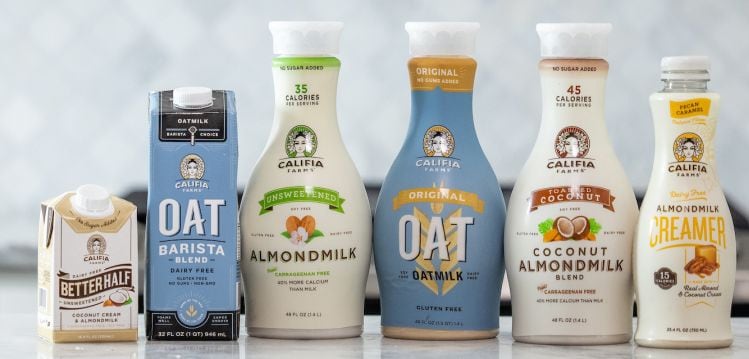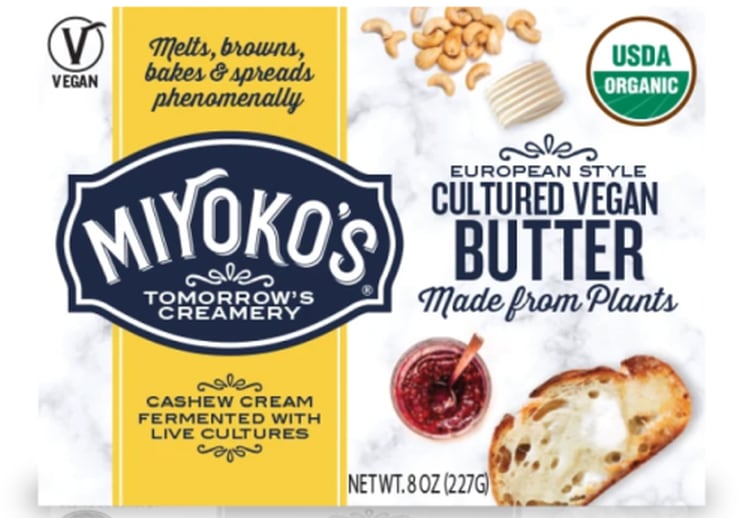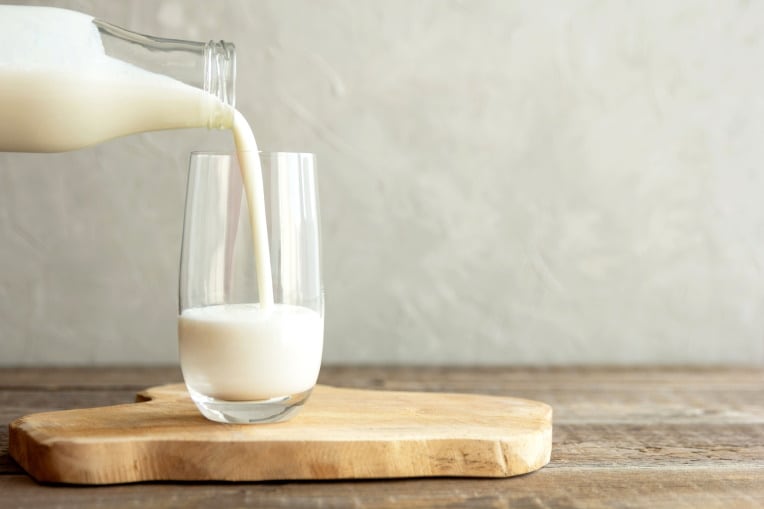The all-singing, all-dancing, 30-second spot (strapline: ‘Calilujah!’) highlighting coconut smoothies, almondmilk and cookies, and the ‘oatmilk of your dreams’ across TV, digital and social platforms, was developed by Goodby Silverstein & Partners and is designed to be joyful and celebratory, says Ritterbush.
“We're talking to the plant curious consumer,” he told FoodNavigator-USA. “These are people that don't want to be labeled or preached to, so this is about that Hallelujah [‘Calilujah’] moment when they discover our products and we wanted to bring that to life in a joyful fun way and celebrate plant-based eating. It’s about joy, about experimentation.”
‘We’re very happy with where we're at from a gross margin standpoint’
Ritterbush – who joined Califia Farms as CEO in October 2020 after stints at the helm of PopChips and Quest Nutrition - will not share net revenues or profits (although he says he’s “very happy with where we're at from a gross margin standpoint and from a profitability standpoint”), but said the California-based company is enjoying solid growth.
“The current growth of ready to drink coffee and creamers is nearly 50% year on year, whereas for plant milk we had a huge spike a year ago, and it’s a little bit more flat now, but if you look at two year growth, plant milks are still up 25% compared to the pre-pandemic level.”
Califia’s away from home business, meanwhile, “continues to grow exponentially,” claimed Ritterbush. “I think our big role is to expand plant-based dairy beyond the coffee shop. Coffee shops are critically important, but it's also about educating chefs and the culinary world about plant-based alternatives. I give great credit to Beyond Meat and Impossible Foods for doing this for plant-based meat.”
‘Win the screen’
E-commerce sales – mostly via retailer platforms – are also growing nicely, he said.
“We have a mantra that's called ‘Win the screen.’ We’ve all been in a world where products were displayed physically and in that cycle of resetting that occurred, maybe twice a year at most, whereas your computer screen is refreshed daily and in some cases, hourly, and so we’ve partnered with digital platforms to make sure Califia is present on that first screen, because we know many people don't move past the first screen.
“We’ve also enhanced our digital content so we can have a greater depth of conversation at the [virtual] shelf with consumers than we can have in a physical brick and mortar environment.”

98%+ fill rates
While Califia is experiencing supply chain challenges, like everyone else, it is “filling our customer orders at a 98%+ level through exceptional advanced planning, increased capacity, and working with multiple vendors and partnerships,” claimed Ritterbush: “We've had to airfreight things at times to make sure we keep service levels up, but I'm thrilled with where we're at.”
Pricing: ‘Right now it's a dynamic situation’
Asked about pricing, he said: “I think right now it's a dynamic situation; everybody's trying to understand what the time periods of these inflationary factors are and whether they're permanent and structural or whether they're transitory.
“So people are hesitant to take price if they are short term costs versus long term, so I think we're still in the evaluation stage of understanding whether this is the new normal or a temporary situation brought on by the pandemic.”
‘The beautiful thing about plant-based beverages is the variety, whereas dairy milk is pretty much segmented only on fat content’
So how are consumers thinking about plant-based milks, and are we going to see a shakeout in the category, which now features everything from hemp and pistachio milk to macadamia and sesame milk, but remains dominated by almond, oat, and soy?
“There will obviously be a point where there's some level of consolidation in the plant milk category, but I don't believe it'll be as narrow as a two or three horse race,” predicted Ritterbush. “The beautiful thing about plant-based beverages is the variety, whereas dairy milk is pretty much segmented only by fat content.
“We can offer different flavors and textures and combine ingredients to create a different set of benefits, so we have a really exciting product coming out soon, which is an oat and almond blend with half the calories of a traditional oat product.”
He added: “Consumers have multiple products in their refrigerator for multiple reasons. I may wake up and have almondmilk in a smoothie because I like the taste and the low calorie, no sugar benefit of almondmilk, but I’ll put oatmilk in my coffee, because I like the texture and the way in which it performs in hot beverages. And then I may have a toasted coconut beverage in the afternoon because I love the flavor.”

Calcium, vitamin D, vitamin A
So what about fortification? Do consumers expect plant-based milks to be fortified with key nutrients?
“For consumers using plant milks as a direct substitute for dairy, they’re first foremost looking for calcium, vitamin D, Vitamin A supplementation, which is fairly standard across our product lines,” said Ritterbush.
“And then we've seen some consumers wanting protein, which is why we have our Protein Oat product, which is exceeding our expectations. But for other consumers, protein is really not a driver.”
Plant-based butters and yogurts withdrawn
While the Califia brand could extend into many categories, it has not found success everywhere, acknowledged Ritterbush, who said the company has withdrawn its plant-based yogurt drinks and plant-based butters to focus on its faster-growing beverage portfolio.
“We've pulled the butters from the marketplace as we’re quite focused on our beverage platform right now and there were some great offerings already that existed in the plant-based spreads and butter category. When Califia brings something to the marketplace, our criteria has to be that we’re bringing something unique to the category in terms of taste or nutrition.
“Our mission is replacing dairy without compromise, and where that works best right now is in fluid plant milk products, which account for 16% of sales. Some of these other more indulgent categories (cheese, desserts, ice cream, yogurt), have a much smaller market share and the challenge is meeting this no-compromise standard that consumers demand and expect.”
‘We’re not overly reliant on any one ingredient’
As for plant sources, said Ritterbush, “We're definitely not tied to any one ingredient. We’ve having tremendous success in almond and coconut and we're having incredible success and growing share in oat; we’ve just announced to the trade that we’ll be coming out with zero sugar oatmilk late in the fourth quarter, early first quarter next year.”
So could oatmilk ultimately eclipse category leader almondmilk? Right now, he said, “anyone who has a high-quality product with distribution is doing well in that segment. But oat is not the ultimate plant-based beverage, and our portfolio approach means we’re not overly reliant on any one ingredient.
“The beauty of Califia is that it doesn't stand for an ingredient, it stands for a philosophy, which extends across really any dairy replacement.”
Labeling in plant-based ‘milk’
When it comes to the thorny issue of labeling plant-based milk, he said, “We're quite active in the Plant Based Foods Association and we were thrilled for the victory of Miyoko [a California judge recently agreed that Miyoko’s plant-based butter labels were not violating the state’s labeling laws], which we think will have a profound impact [on the ongoing debate over labeling in the segment].
“There is no confusion in the way in which products are labeled, it's really almost insulting I think to the American public to argue that there is.”
As for the ‘nutritional equivalence’ argument – that consumers are not confused about the origin of plant-based products (they know almondmilk isn’t from a cow) but may assume ‘plant-based’ means ‘healthier,’ – he said:
“Some plant-based milks have less protein [than dairy] but we offer products with equivalent protein to milk [the Protein Oat line] and we offer the same levels of calcium and vitamin D and A, with a fraction of the sugar, calories, water use and carbon emissions, so I don't quite honestly understand that [nutritional equivalence] argument either.”
Animal-free dairy will play a role… but Califia is focused on plant-based options
Quizzed about the emerging ‘animal-free’ dairy segment, which utilizes ‘real’ dairy proteins such as whey and casein made by microbes instead of cows, Ritterbush predicts “it will play a role going forward in our food system,” but notes that Califia Farms has a clear plant-based positioning.
“We’re watching this and want to understand it, but our desire is to stay as close to plants as possible.”

"The plant milk industry takes itself so seriously. It’s all about eating healthy and being a better person. We didn't want to guilt people into trying us, we wanted to be joyful and celebratory and make people feel happy when they pick up a bottle, without all the baggage that usually comes from this category."
Kurt Mills, associate creative director, Goodby Silverstein




